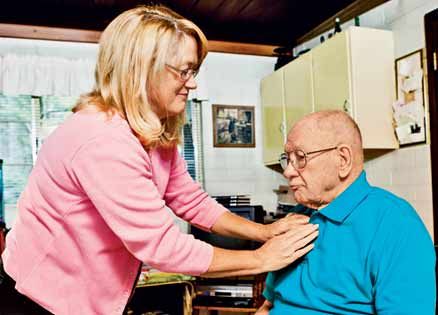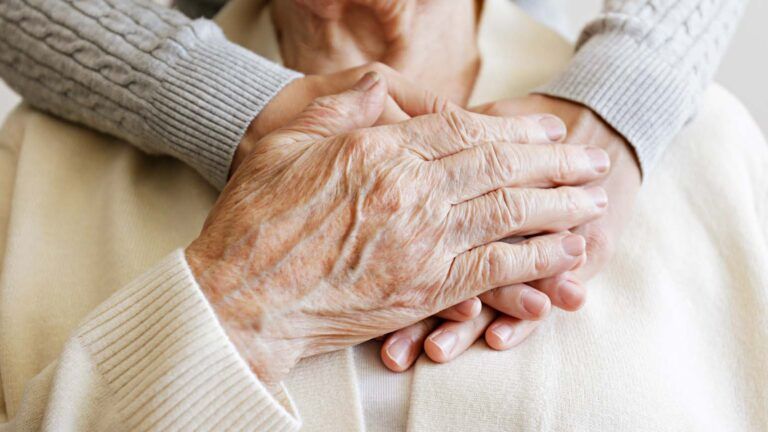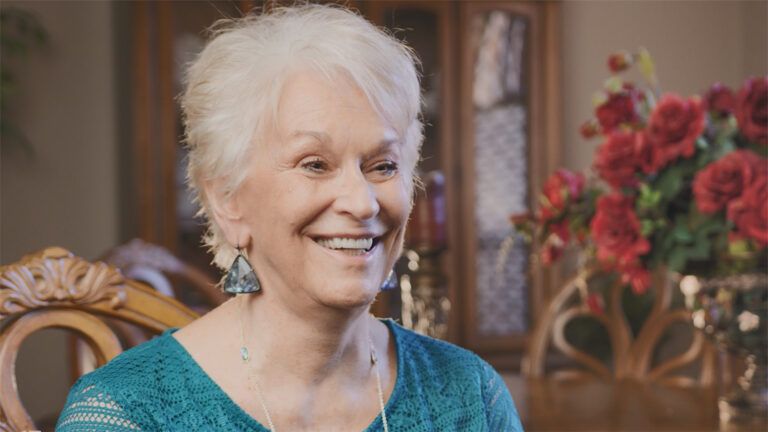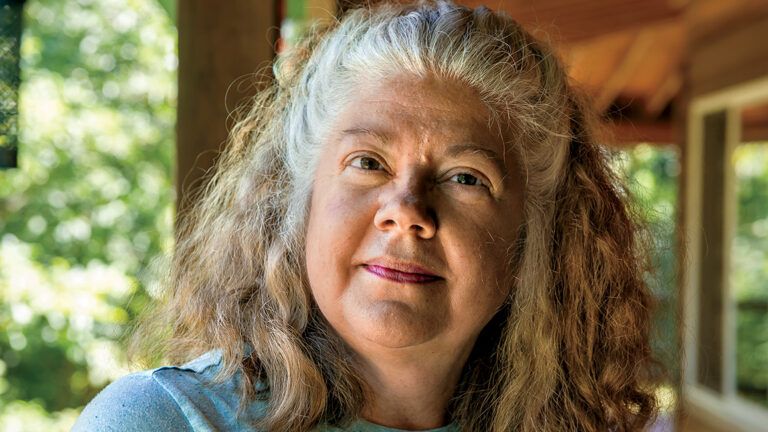How did Mom ever put up with all of this? I wondered, not for the first time since my husband, Mike, and I had moved in with my elderly father after my mother passed away.
The living room was a total mess. I stacked the condolence cards into a neat pile on the coffee table and swept a dying flower arrangement into the garbage pail. Then I stacked the now-empty boxes Mike and I had packed our things in to make the move to Dad’s.
Finally I picked up a laundry basket and gathered up the dirty socks Dad had dropped on the floor near the couch. I balanced the basket against my hip and headed down the hall. Cautiously, I approached the open doorway to my parents’ bedroom. Dad sat on the edge of the bed, fumbling with his gray-striped pajama top.
“Do you need any help?” I asked.
He didn’t look up. “They must be making these buttons smaller than they used to,” he grumbled.
I sighed. Mike and I had moved in with Dad both to ease our financial burden after our pizza restaurant went under and to help Dad adjust to life without his wife of 52 years. Mike went back to school to become a pharmacy technician and was in class much of the day.
I spent most of my time with Dad. I wasn’t sure how long I could keep this up. Being with him made me feel all knotted up inside.
To say Dad and I didn’t get along would have meant we had some kind of relationship. We didn’t. Not since I left home after high school. Picking out Mom’s casket was the first thing we had ever done together. I was the second of four girls and that was what he called me: “Number Two.” No name, just a digit.
He was harsh and judgmental with my sisters and me, and he had a temper. Once we were grown, none of us girls wanted anything to do with Dad. It was Mom we loved and stayed in touch with.
My younger sister and I were shocked at what we found when we visited Dad in the weeks after Mom’s funeral. Dad’s medications were scattered haphazardly on the counter and he had no idea which was which. He frequently lost his footing on the uneven terrain of the acreage surrounding the house.
The landscaped flower beds and lawn he’d always showed off now looked more like a vacant lot, overgrown with weeds and strewn with broken gardening equipment. It was clear Mom had picked up the slack the past few years.
“He needs more help than we can give him,” my younger sister said. “He needs to be in a retirement home.”
I was inclined to agree, but memories of Mom wouldn’t let me. She loved Dad—Lord only knew why—and she would not have wanted to see him forced out of his home. Along with our business, Mike and I lost our house and needed a place to live. So moving in with Dad seemed like a solution for all of us.
I’d thought it was God’s timing, but now I wondered, Lord, how can I take care of this man I don’t really care for? Teach me how to love the unloveable.
I looked at Dad, his pajama shirt all twisted. The few buttons he had managed to close didn’t match up right. It might have been comical, if it weren’t so sad. I was so used to dreading him that I was surprised to feel a twinge of sympathy. “You know, Dad, if you want, I can sew the buttons closed, then you could just slip the top over your head.”
Dad nodded. “That’s a good idea,” he said.
A compliment? First one I could remember. I put the laundry basket down and sat next to him on the bed. Slowly I rebuttoned his top.
It felt so strange! Growing up, I lived in constant fear of the man.
No matter how awful he’s been, he’s helpless now, I thought, fastening the last button. He needed someone. But, Lord, why me?
For the first few weeks, I clung to the hope that somehow I could teach Dad to live independently and that this living situation was only temporary. But soon it was obvious that he had age-related dementia.
He couldn’t learn how to wash his clothes or vacuum the floor. He couldn’t shop for food, much less make it himself. All the things Mom used to do for him. I drove him to doctors’ appointments and helped him go from using a walker to pushing himself in a wheelchair.
“Deep down, I know he appreciates you,” Mike told me.
“Does he?” I wondered.
One day, Mike went into town and I got to weeding the flower bed. Dad sat on the porch in his favorite wooden chair and watched two gray squirrels chasing each other around the big old oak trees that shaded the lawn.
“Well, Dad,” I said, standing and brushing the dirt from the knees of my blue jeans, “I should go in and see about putting something on for lunch.”
“Whatever you think is best, Babe,” Dad said, gazing out over the acreage.
I paused in mid-stride. Did he just call me “Babe”? It sounded a lot better than “Number Two.” I heated some soup and brought it out to him.
With a shaky hand, he slurped it up. “Thank you,” he said when he was done. Another first!
Lord, are you playing with me? I asked.
A friend volunteered to come over once a week to sit with Dad so that I could get out and run some errands. The first time, she visited with Dad on the front porch so that they could get to know one another. “How long have you lived here?” she asked him.
“Oh, I don’t know, maybe two or three years,” he said.
“No, Dad,” I said, “you’ve lived here for over ten years.”
A flummoxed look came across his face. He struggled for words. “That’s the tough thing about growing old,” he finally said. “Some days you can’t remember where you were born, when you were born or even if you were born.”
He looked so beaten and vulnerable. I felt myself soften. “When I come back, why don’t we go for a ride on the quad,” I said. The four-wheel “Putt-Putt” was the only way Dad could make it to the furthest reaches of the property. “Wecan check out the pear trees at the edge of the field.”
Dad perked up. “Sounds good to me,” he said, mouth curled up into a smile.
That afternoon, I drove the quad up to the front porch. “Hop on,” I said.
Dad shook his head. “Let me drive,” he said. One of the few things he could still do.
I hesitated. Dad shook his head again, stubbornly. Oh, Lord, here we go. I hopped off. Dad grasped the handlebars and pulled himself onto the front seat. I climbed on in back of him. “Hold on tight,” he instructed.
We took off toward the end of the field. Leaning in against Dad, I felt the warmth of his body against mine. I couldn’t remember a time when we’d been that close.
“Look,” Dad said, pointing ahead. Two white-spotted deer were standing at the corner of the orchard. We stopped and watched in silence as they grazed. The peaceful silence of two people savoring a moment together.
Slowly we wove our way back to the house. Dad climbed off and I held out my arm to support him. “Hey, Dad,” I said, “I picked up those ice cream bars you like when I did the shopping. Do you want one?”
“My favorite,” he said. I helped him into his wheelchair and pushed him to the front porch. He looked up at me. “Margaret?”
My heart skipped a beat. I almost didn’t recognize my name coming from his lips. “Yes, Dad?”
“Thank you,” he said. “You take such good care of me.”
I felt the knot inside me come loose. This was the man I had once found impossible to love. Dad and I had both been brought low by circumstances beyond our control, and in this new place, there wasn’t room for anger or resentment. There was peace, tenderness, even love.
That was really why God had brought me here, I realized. Not out of desperation, but for a chance to settle the past and to finally have a relationship with my father.
“I’m here for you, Dad,” I said, resting my hand on his shoulder, “as long as I need to be.”
Reduce the stress of caregiving and avoid burnout with these tips and resources.





